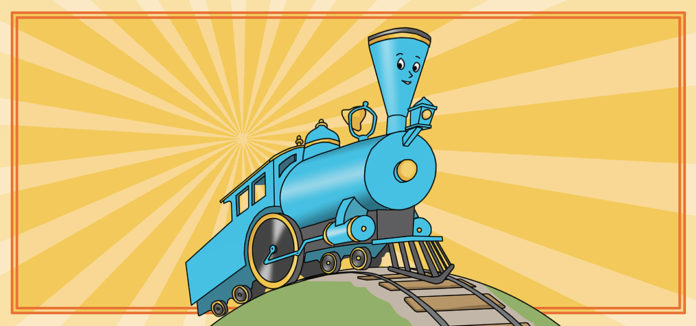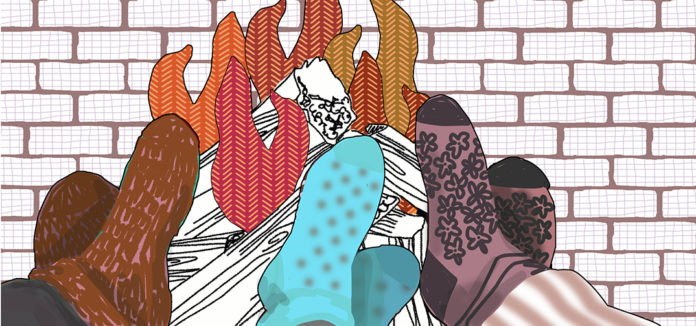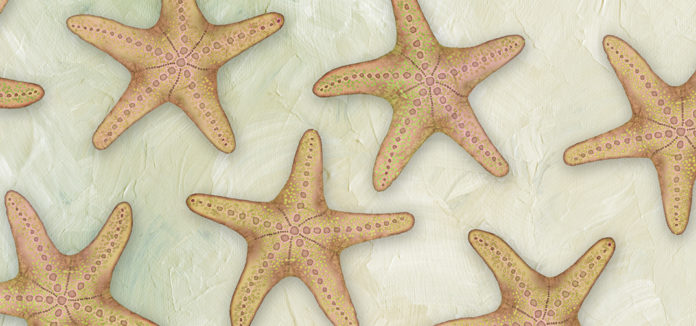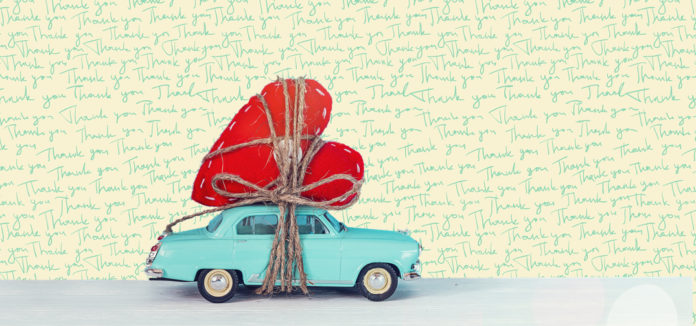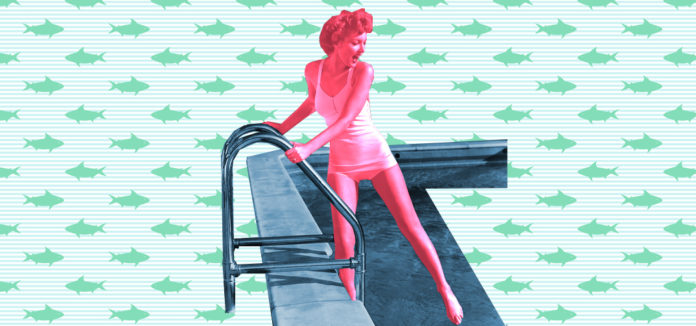Danielle Duboise and Whitney Tingle are the co-founders of Sakara Life, a fresh, organic and plant-based nationwide meal delivery service.
Realistic Resolutions That Will Actually Stick
Full disclosure: New Year’s resolutions are the bane of my January-February existence. In theory, they are a wonderfully positive chance to turn over a new leaf — to try to get more sleep, exercise more, spend more time with the family and less time plugged into work. In reality, for many, they are something we do for a few weeks and then can’t maintain for various reasons, legitimate or not. Either we set too many goals at once or we set unrealistic goals.
But resolutions don’t need to be wishful thinking (nor do they need to be relegated to just the January time slot, either). Here are some truly easy ways to make and keep those resolutions:
Set S.M.A.R.T Goals
There’s an art to setting goals that will make achieving them much easier. Remember this equation: Specific Measurable Align with values Realistic Time-based. So don’t just say you want to lose weight. Rather, you want to get healthier by losing 5 pounds in one month so you check your weight every morning before eating oatmeal for breakfast and walking to work.
Focus, Don’t Fix
How many of our resolutions are about changing something we don’t like about ourselves? Here’s a twist that will help maintain that goal: focus on the positive and choose a resolution around something that you’re good at. For instance, if you love art, resolve to go to the museum once a month or paint more. If you love playing tennis, commit to a doubles group.
To Fail is Human (and Good For You)
There’s no reason to scrap an entire goal because you missed a few workouts, ate a donut or smoked a cigarette. Put it in perspective — did you ace every test in school? Figure out what you did wrong and “fail better,” learn from your mistakes and come up with a new strategy that will serve you all year long. And maybe allow yourself a little leeway so you’re less likely to completely give up.
The Little Engine That Could Was Right
Saying “I think I can, I think I can” translates into a deep-seeded belief in one’s capabilities and ultimately, one’s well-being. It’s the self-efficacy theory. Believing you can accomplish what you want is more than just a mindset. It’s a path to success.
Time Check
It’s time to spend more time doing things that we value doing — it’ll be healthy for us. (And no, watching tv, playing video games and working are not on that list. Most people say they feel unsatisfied after doing them.) Time well spent can be anything from spending time outdoors, in charitable activities, socializing with friends and family and yes, relaxing or just daydreaming. Write down the three most important things in your life — and then do them.
I wish you all the best,
Dr. Samantha Boardman
Is Home a Feeling or a Place?
It is said that home is a feeling, not a place. But for many of us, the house we grew up in occupies sacred ground in our hearts. No matter how old we are or how many miles away we live, it still feels like home. We may feel “at home” in a number of different places but only a handful have the distinction of being home.
Whenever I visit my parent’s old house in the city, where my father now lives with my stepmother, the instinctive feeling of being truly home washes over me. Before I walk through the doorway, I know I have arrived. Even if I were blindfolded, I could identify the distinctive sound of the gravel as the car rolls into the driveway. From basement to attic, I know every nook and cranny. In an ever-changing world, the familiar smell, the unique creak of the cupboards, and the eternal cracks in the wooden floor have all reassuringly remained the same. The house is a psychological haven for me — where the stress of adult life melts away and I am inspired by a feeling of being a kid again. Nostalgia? Sure, but it’s more than that. It provides a sense of identity and also reminds me of how far I have come.
We have a powerful connection to the places that shaped us, and research is beginning to gain a deeper understanding of the visceral and intangible feeling that these special places evoke. Using fMRI brain technology, researchers found that key areas of emotional processing in the brain are activated by places that participants had strong emotional ties to. Related research supported that meaningful places induce a sense of calmness and belonging. Fond memories and shared experiences with family and friends contribute significantly to why these places make us feel complete. These findings shed light on the magnetic pull our childhood homes have on so many of us and why we love going home for the holidays.
There is a flipside. While some love the idea of being with family during the holidays, not everyone feels warm and fuzzy about it. Past grievances, painful memories and diverging political opinions are among the many reasons this time of year can be stressful. To minimize friction, spend as much time as you can gathered around the fireplace. Research by anthropologist Polly Wiessner shows that once our ancestors learned to control fire, in addition to using it for cooking, they began to use it for storytelling as well. By extending the day, fire allowed people to unleash their imaginations and engage others with stories which, in turn, fostered deeper social connections.
According to Wiessner, “Stories told by firelight put listeners on the same emotional wavelength and elicited understanding, trust, and sympathy.”
A place full of understanding, trust, and sympathy… Sounds like home to me.
This post originally appeared on Tory Burch.
I wish you all the best,
Dr. Samantha Boardman
Achieve the Impossible
What makes human beings unique? In an unforgettable speech to a Stanford graduating class, neuroscientist Robert Sapolsky explores this question and challenges what many of us think about what separates us from animals.
It turns out that we may not be so special after all.
“There is nothing fancy about us at all. We are just a basic off-the-rack mammal,” says Sapolsky.
Over the years, traits and abilities once thought to set human beings apart have been found in other species. For example, bats observe the Golden Rule. Chimpanzees exhibit empathy. The dark side of what was once thought to be specific to human nature is evident in other species too. As Saposkly explains, we are not the only species that kill our own kind in cold blood:
Other species kill strategically in ways that would make Machiavelli proud.
That said, there are some things that humans do for which there is no analogy in the animal world. According to Sapolsky, what is most defining about human beings is the ability to deal with contradictions.
To illustrate, he cites the case of a Catholic nun who ministers to prisoners on death row in Louisiana. He describes the men as:
…some of the most frightening, nightmarish humans who have ever walked this Earth.
When asked how she can spend her time with such men, she replies:
The less forgivable the act, the more it must be forgiven. The less lovable the person is, the more you must find the means to love them.
As a strident atheist, this strikes Saposkly:
…as the most irrational, magnificent thing we are capable of as a species.
Sapolsky’s insight about our ability to withstand contradiction reminds me of the wonderful story about a man who encounters a young boy on a beach. The beach is strewn with thousands of starfish that had washed up onto the shore after a storm. The boy is picking up the starfish, one by one, and throwing them back into the ocean so they won’t die.
The old man says, “But, young man, do you not realize that there are miles and miles of beach and there are starfish all along every mile? You can’t possibly make a difference!”
At this, the young man bent down, picked up yet another starfish and threw it into the ocean. As it met the water he said, “It made a difference for that one.”
The ability to embrace contradictions is indeed magnificent. As human beings, we are capable of forgiving the unforgivable, loving the unlovable, transcending the unfathomable and achieving the impossible. Just because we know a single person cannot really make a difference, it is all the more necessary that we must try to make a difference.
No act of kindness, no matter how small, is ever wasted. ~Aesop
I wish you all the best,
Dr. Samantha Boardman
Gratitude is a Verb
I probably say “thank you” at least 50 times a day. It’s not because I have excessive amounts of gratitude; it’s an automatic response. As a small child I was trained to say thank you, and it stuck. So here I am today, saying thank you for everything and anything – to the waiter who forgot my lunch order, to the receptionist who informs me my appointment was cancelled, and to the insurance agent who denied a request for a medication I prescribed to a patient.
Robotically saying “thank you” is not the same as practicing gratitude. According to research, people who count their blessings on a regular basis are happier and healthier than those who don’t. Taking five to ten minutes at the end of each day to write down three things that went well and why has a measurable and positive effect on wellbeing.
Researchers and wellness experts call this a gratitude journal, and for many people it does wonders. But, full disclosure, it didn’t work for me. Focusing on myself and how lucky I was made me feel good in the moment but it didn’t last. After a while it felt smug and a little self-centered. It’s not that I don’t appreciate being the beneficiary of good things. There was just something missing.
It turns out there is a lot more to gratitude than being thankful for what you have. In her article, “Stop Making Gratitude All About You,” Professor Heidi Grant Halvorson captures what so many of us get wrong about gratitude:
Recent research suggests that people often make a critical mistake when expressing gratitude: They focus on how they feel — how happy they are, how they have benefited from the help — rather than focusing on the benefactor.
Halvorson’s research found that those who expressed gratitude towards another person had stronger and more loving relationships than those who focused on the benefits to themselves. In other words, if your partner sends you flowers today, you can think to yourself about how receiving flowers makes you really happy or you can channel your gratitude towards your partner by actively saying or doing something that acknowledges how awesome your partner is.
Related studies by Adam Grant highlight how gratitude is not limited to passively counting one’s blessings. His research shows that reflecting on what one has contributed instead of reflecting on what one has received, is even more powerful in terms of promoting prosocial behavior. As Grant concludes:
According to a popular mantra, we should give without remembering and receive without forgetting. Our research suggests otherwise: we should take the time to remember both what we’ve given and what we’ve received.
So this Thanksgiving, don’t just count your blessings. Count your contributions too.
Think of gratitude as an action. It’s a verb that works best when it is embodied, spoken aloud and when it connects you to someone else.
I wish you all the best,
Dr. Samantha Boardman
How to Push Past Fear
According to most swimming superstars,“Getting in a cold pool first thing in the morning” is the single hardest thing about training. Those first few minutes are the toughest part of the day. They dread the initial immersion in the chilly water and even though they do it everyday most say they never get used to it.
But once they’re in, they’re in.
Overcoming the initial pain, worry, or discomfort can be the most challenging part of any endeavor but it is the only way to reach your potential:
Just like how athletes must practice to be comfortable in discomfort, you must as well if you hope to improve your skills and advance your career. The hard stuff, the stuff you’d rather skip or do later is often the stuff that’s most necessary. Every time we choose to play it safe or bypass challenging intellectual prompts, we impede our ability to innovate and grow, waste our own (or our company’s) money, and squander our talent.
Fear is often at the core of resistance to make a change. So how do you push past it? Break it down. Ask yourself, “What is the very first step I need to take?” and take it. As Special Forces Instructor Mark Hickey describes,
I can say from my own experience that after you do one thing and conquer it, the next thing is a little bit easier.
Each time you fight through the discomfort, you arm yourself with confidence, you fortify yourself with experience and you inoculate yourself against setbacks. Taking action is empowering regardless of the outcome. Don’t hesitate or dip your toe in the water.
The best way to deal with initial discomfort is to literally jump in as the swimmers do. I cannot promise that the rest will go swimmingly well but getting wet certainly makes swimming easier
I wish you all the best,
Dr. Samantha Boardman


